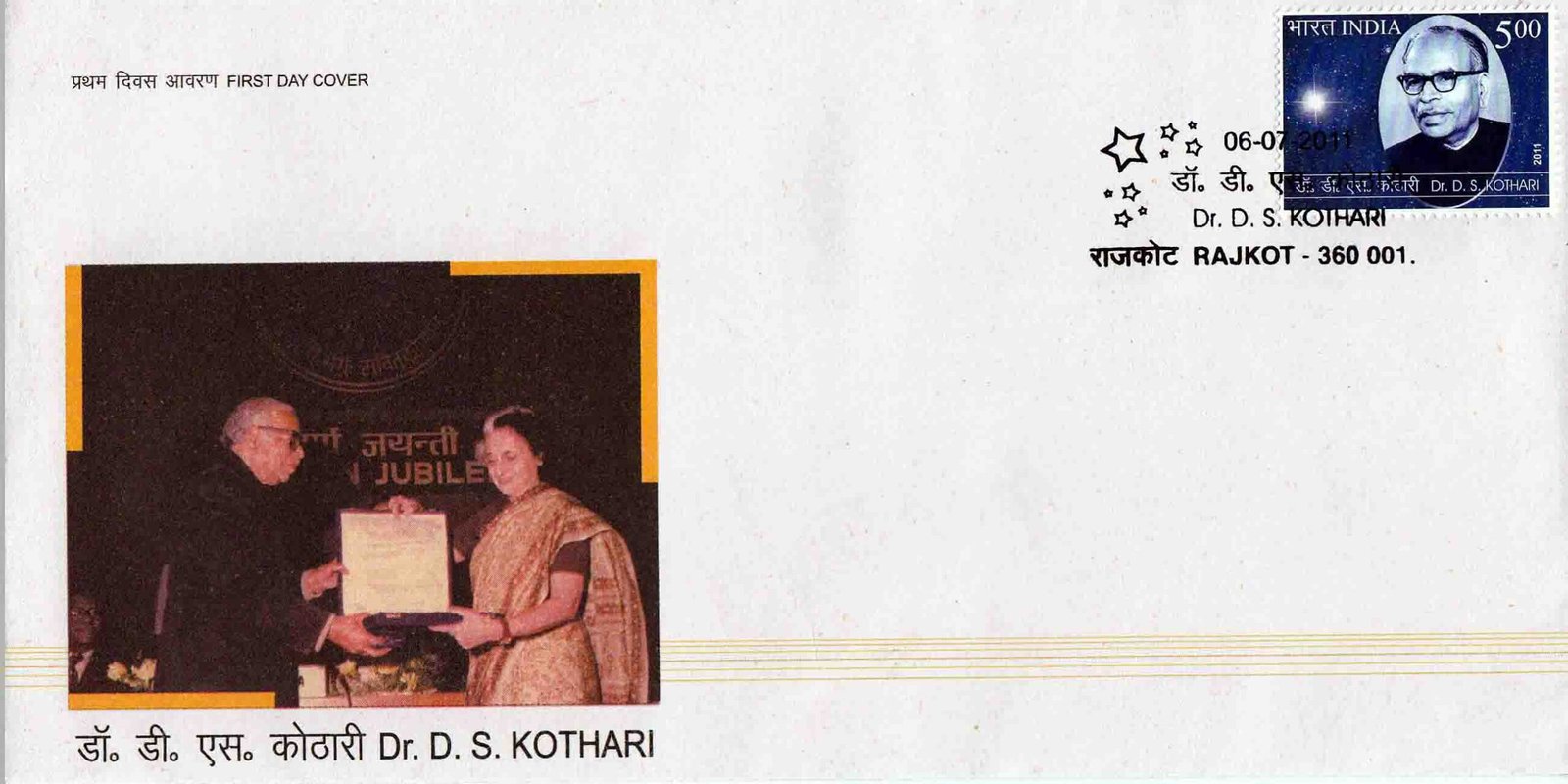D S Kothari

Technical Data
| Stamp Set | D S Kothari |
|---|---|
| Date of Issue | July 6, 2011 |
| Denomination | Rs. 5 |
| Quantity | 300,000 |
| Perforation | 13½ |
| Printer | Security Printing Press, Hyderabad |
| Printing Process | Wet Offset |
| Watermark | No Watermark |
| Colors | Multicolor |
| Credit (Designed By) | Ms. Nenu Gupta |
| Catalog Codes |
Michel IN 2603 Yvert et Tellier IN 2336 Stanley Gibbons IN 2819 WADP Numbering System - WNS IN027.2011 |
| Themes | Anniversaries and Jubilees | Commemoration | Famous people | Men | Optical Instruments | Scientists | Teachers |
Daulat Singh Kothari was born on July 6, 1906 at Udaipur to Shri Fateh Lal Kothari, a school teacher. After the death of his father in 1918 he was brought up by his mother, a devout and generous lady.
After his early education in Udaipur, Kothari went to Indore to complete his matriculation, returning thereafter to Udaipur to complete further studies. The Maharana of Mewar granted him a monthly scholarship of Rs. 50/- for his outstanding performance in Intermediate exams in 1924. Completing the B.Sc. degree from Allahabad University in 1926 with flying colours, under the guidance of Shri Meghnad Saha, a noted physicist, he went on to obtain M.Sc. in 1928 with specialisation in Wireless (now renamed as Electronics).
Due to his excellent academic record, Kothari was appointed as a demonstrator in the Department of Physics at the Allahabad University. After two years he proceeded to England for higher studies on scholarship from the State of the United Province and an interest free loan from the Mewar State Government. He completed his PhD under the supervision of Ernst Rutherford at the Cavendish Laboratory, Cambridge.
In May 1934, Kothari joined the Delhi University as Reader and Head of Physics Department. Delhi University was then in its embryonic stage. After joining, he brought several changes in the department by introducing new experiments, facilities, libraries, invited eminent physicists to deliver lectures, established an active research group in physical science and also started the M.Sc. course in Delhi University.
He also published many research papers in various branches of physics and astrophysics. His work on pressure ionisation was highly acclaimed and found wide ranging applications.
Dr. Kothari was appointed as Scientific Advisor to the Ministry of Defence, Government of India in 1948. During his tenure he established many laboratories under the aegis of Defence Science Organisation. He retained this position till 1961 when he was appointed the Chairman, University Grants Commission. Dr. Kothari has made immense contribution to the field of education and was appointed as the Chairman of the Indian Education Commission in 1964 by the Government of India. He was also associated with the National Council of Educational Research and Training (NCERT). He reemphasised the role and functions of NCERT and gave a blue print for its future development in the Report of the Education Commission (1964–66). He played a significant role in the formulation of the examination and selection process for central services and the Government subsequently launched the Talent Search Programme under the auspices of National Talent Search Programme also owe their origin to his vision. He has served as the Chairman of the UNESCO Institute of Education at Hamburg, was the President of the Jawaharlal Nehru Memorial Fund, President of the Indian National Science Academy and General President of the Indian Science Congress in 1963. He was also appointed as Chairman of the Committee on Recruitment Policy and Selection Methods of UPSC in 1974.
In addition to several honours and awards to his contribution in the field of science and education, he received the Padma Bhushan in 1962 and the Padma Vibhushan in 1973.
He passed away on 4 Feb 1993
First Day Cover

